- Home
- Howard Pyle
Stolen Treasure
Stolen Treasure Read online
Table of Contents
Stolen Treasure, by Howard Pyle
* * *
The Project Gutenberg EBook of Stolen Treasure, by Howard Pyle This eBook is for the use of anyone anywhere at no cost and with almost no restrictions whatsoever. You may copy it, give it away or re-use it under the terms of the Project Gutenberg License included with this eBook or online at www.gutenberg.net
Title: Stolen Treasure
Author: Howard Pyle
Release Date: December 7, 2003 [EBook #10394]
Language: English
Character set encoding: ISO-8859-1
*** START OF THIS PROJECT GUTENBERG EBOOK STOLEN TREASURE ***
* * *
Produced by David Widger, Juliet Sutherland, Linda Cantoni and PG Distributed Proofreaders
* * *
STOLEN TREASURE
BY
HOWARD PYLE
Author of "Men of Iron" "Twilight Land" "The Wonder Clock" "Pepper and Salt"
ILLUSTRATED BY THE AUTHOR
MCMVII
* * *
CONTENTS
I. WITH THE BUCCANEERS
II. TOM CHIST AND THE TREASURE-BOX
III. THE GHOST OF CAPTAIN BRAND
IV. THE DEVIL AT NEW HOPE
* * *
ILLUSTRATIONS
"'I'VE KEPT MY EARS OPEN TO ALL YOUR DOINGS'"
"THIS FIGURE OF WAR OUR HERO ASKED TO STEP ASIDE WITH HIM"
"OUR HERO, LEAPING TO THE WHEEL, SEIZED THE FLYING SPOKES"
"SHE AND MASTER HARRY WOULD SPEND HOURS TOGETHER"
"'... AND TWENTY-ONE AND TWENTY-TWO'"
"''TIS ENOUGH,' CRIED OUT PARSON JONES, 'TO MAKE US BOTH RICH MEN'"
"CAPTAIN MALYOE SHOT CAPTAIN BRAND THROUGH THE HEAD"
"HE WOULD SHOUT OPPROBRIOUS WORDS AFTER THE OTHER IN THE STREETS"
* * *
STOLEN TREASURE
* * *
I. WITH THE BUCCANEERS
Being an Account of Certain Adventures that Befell Henry Mostyn under Captain H. Morgan in the Year 1665-66.
I
Although this narration has more particularly to do with the taking of the Spanish Vice-Admiral in the harbor of Puerto Bello, and of the rescue therefrom of Le Sieur Simon, his wife and daughter (the adventure of which was successfully achieved by Captain Morgan, the famous buccaneer), we shall, nevertheless, premise something of the earlier history of Master Harry Mostyn, whom you may, if you please, consider as the hero of the several circumstances recounted in these pages.
In the year 1664 our hero's father embarked from Portsmouth, in England, for the Barbadoes, where he owned a considerable sugar plantation. Thither to those parts of America he transported with himself his whole family, of whom our Master Harry was the fifth of eight children--a great lusty fellow as little fitted for the Church (for which he was designed) as could be. At the time of this story, though not above sixteen years old, Master Harry Mostyn was as big and well-grown as many a man of twenty, and of such a reckless and dare-devil spirit that no adventure was too dangerous or too mischievous for him to embark upon.
At this time there was a deal of talk in those parts of the Americas concerning Captain Morgan, and the prodigious successes he was having pirating against the Spaniards.
This man had once been an indentured servant with Mr. Rolls, a sugar factor at the Barbadoes. Having served out his time, and being of lawless disposition, possessing also a prodigious appetite for adventure, he joined with others of his kidney, and, purchasing a caraval of three guns, embarked fairly upon that career of piracy the most successful that ever was heard of in the world.
Master Harry had known this man very well while he was still with Mr. Rolls, serving as a clerk at that gentleman's sugar wharf, a tall, broad-shouldered, strapping fellow, with red cheeks, and thick red lips, and rolling blue eyes, and hair as red as any chestnut. Many knew him for a bold, gruff-spoken man, but no one at that time suspected that he had it in him to become so famous and renowned as he afterwards grew to be.
The fame of his exploits had been the talk of those parts for above a twelvemonth, when, in the latter part of the year 1665, Captain Morgan, having made a very successful expedition against the Spaniards into the Gulf of Campeachy--where he took several important purchases from the plate fleet--came to the Barbadoes, there to fit out another such venture, and to enlist recruits.
He and certain other adventurers had purchased a vessel of some five hundred tons, which they proposed to convert into a pirate by cutting port-holes for cannon, and running three or four carronades across her main-deck. The name of this ship, be it mentioned, was the Good Samaritan, as ill-fitting a name as could be for such a craft, which, instead of being designed for the healing of wounds, was intended to inflict such devastation as those wicked men proposed.
Here was a piece of mischief exactly fitted to our hero's tastes; wherefore, having made up a bundle of clothes, and with not above a shilling in his pocket, he made an excursion into the town to seek for Captain Morgan. There he found the great pirate established at an ordinary, with a little court of ragamuffins and swashbucklers gathered about him, all talking very loud, and drinking healths in raw rum as though it were sugared water.
And what a fine figure our buccaneer had grown, to be sure! How different from the poor, humble clerk upon the sugarwharf! What a deal of gold braid! What a fine, silver-hilted Spanish sword! What a gay velvet sling, hung with three silver-mounted pistols! If Master Harry's mind had not been made up before, to be sure such a spectacle of glory would have determined it.
This figure of war our hero asked to step aside with him, and when they had come into a corner, proposed to the other what he intended, and that he had a mind to enlist as a gentleman adventurer upon this expedition. Upon this our rogue of a buccaneer Captain burst out a-laughing, and fetching Master Harry a great thump upon the back, swore roundly that he would make a man of him, and that it was a pity to make a parson out of so good a piece of stuff.
[Illustration: "THIS FIGURE OF WAR OUR HERO ASKED TO STEP ASIDE WITH HIM"]
Nor was Captain Morgan less good than his word, for when the Good Samaritan set sail with a favoring wind for the island of Jamaica, Master Harry found himself established as one of the adventurers aboard.
II
Could you but have seen the town of Port Royal as it appeared in the year 1665 you would have beheld a sight very well worth while looking upon. There were no fine houses at that time, and no great counting-houses built of brick, such as you may find nowadays, but a crowd of board and wattled huts huddled along the streets, and all so gay with flags and bits of color that Vanity Fair itself could not have been gayer. To this place came all the pirates and buccaneers that infested those parts, and men shouted and swore and gambled, and poured out money like water, and then maybe wound up their merrymaking by dying of fever. For the sky in these torrid latitudes is all full of clouds overhead, and as hot as any blanket, and when the sun shone forth it streamed down upon the smoking sands so that the houses were ovens and the streets were furnaces; so it was little wonder that men died like rats in a hole. But little they appeared to care for that; so that everywhere you might behold a multitude of painted women and Jews and merchants and pirates, gaudy with red scarfs and gold braid and all sorts of odds and ends of foolish finery, all fighting and gambling and bartering for that ill-gotten treasure of the be-robbed Spaniard.
Here, arriving, Captain Morgan found a hearty welcome, and a message from the Governor awaiting him, the message bidding him attend his Excellency upon the earliest occasion that offered. Whereupon, taking our hero (of whom he had grown prodigiously fond) along with him, our pirate went, without any loss of time, to visit Sir Thomas Modiford, who was then th
e royal Governor of all this devil's brew of wickedness.
They found his Excellency seated in a great easy-chair, under the shadow of a slatted veranda, the floor whereof was paved with brick. He was clad, for the sake of coolness, only in his shirt, breeches, and stockings, and he wore slippers on his feet. He was smoking a great cigarro of tobacco, and a goblet of lime-juice and water and rum stood at his elbow on a table. Here, out of the glare of the heat, it was all very cool and pleasant, with a sea-breeze blowing violently in through the slats, setting them a-rattling now and then, and stirring Sir Thomas's long hair, which he had pushed back for the sake of coolness.
The purport of this interview, I may tell you, concerned the rescue of one Le Sieur Simon, who, together with his wife and daughter, was held captive by the Spaniards.
This gentleman adventurer (Le Sieur Simon) had, a few years before, been set up by the buccaneers as Governor of the island of Santa Catherina. This place, though well fortified by the Spaniards, the buccaneers had seized upon, establishing themselves thereon, and so infesting the commerce of those seas that no Spanish fleet was safe from them. At last the Spaniards, no longer able to endure these assaults against their commerce, sent a great force against the freebooters to drive them out of their island stronghold. This they did, retaking Santa Catherina, together with its Governor, his wife, and daughter, as well as the whole garrison of buccaneers.
This garrison were sent by their conquerors, some to the galleys, some to the mines, some to no man knows where. The Governor himself--Le Sieur Simon--was to be sent to Spain, there to stand his trial for piracy.
The news of all this, I may tell you, had only just been received in Jamaica, having been brought thither by a Spanish captain, one Don Roderiguez Sylvia, who was, besides, the bearer of despatches to the Spanish authorities relating the whole affair.
Such, in fine, was the purport of this interview, and as our hero and his Captain walked back together from the Governor's house to the ordinary where they had taken up their inn, the buccaneer assured his companion that he purposed to obtain those despatches from the Spanish captain that very afternoon, even if he had to use force to seize them.
All this, you are to understand, was undertaken only because of the friendship that the Governor and Captain Morgan entertained for Le Sieur Simon. And, indeed, it was wonderful how honest and how faithful were these wicked men in their dealings with one another. For you must know that Governor Modiford and Le Sieur Simon and the buccaneers were all of one kidney--all taking a share in the piracies of those times, and all holding by one another as though they were the honestest men in the world. Hence it was they were all so determined to rescue Le Sieur Simon from the Spaniards.
III
Having reached his ordinary after his interview with the Governor, Captain Morgan found there a number of his companions, such as usually gathered at that place to be in attendance upon him--some, those belonging to the Good Samaritan; others, those who hoped to obtain benefits from him; others, those ragamuffins who gathered around him because he was famous, and because it pleased them to be of his court and to be called his followers. For nearly always your successful pirate had such a little court surrounding him.
Finding a dozen or more of these rascals gathered there, Captain Morgan informed them of his present purpose--that he was going to find the Spanish captain to demand his papers of him, and calling upon them to accompany him.
With this following at his heels, our buccaneer started off down the street, his lieutenant, a Cornishman named Bartholomew Davis, upon one hand and our hero upon the other. So they paraded the streets for the best part of an hour before they found the Spanish captain. For whether he had got wind that Captain Morgan was searching for him, or whether, finding himself in a place so full of his enemies, he had buried himself in some place of hiding, it is certain that the buccaneers had traversed pretty nearly the whole town before they discovered that he was lying at a certain auberge kept by a Portuguese Jew. Thither they went, and thither Captain Morgan entered with the utmost coolness and composure of demeanor, his followers crowding noisily in at his heels.
The space within was very dark, being lighted only by the doorway and by two large slatted windows or openings in the front.
In this dark, hot place--not over-roomy at the best--were gathered twelve or fifteen villanous-appearing men, sitting at tables and drinking together, waited upon by the Jew and his wife. Our hero had no trouble in discovering which of this lot of men was Captain Sylvia, for not only did Captain Morgan direct his glance full of war upon him, but the Spaniard was clad with more particularity and with more show of finery than any of the others who were there.
Him Captain Morgan approached and demanded his papers, whereunto the other replied with such a jabber of Spanish and English that no man could have understood what he said. To this Captain Morgan in turn replied that he must have those papers, no matter what it might cost him to obtain them, and thereupon drew a pistol from his sling and presented it at the other's head.
At this threatening action the innkeeper's wife fell a-screaming, and the Jew, as in a frenzy, besought them not to tear the house down about his ears.
Our hero could hardly tell what followed, only that all of a sudden there was a prodigious uproar of combat. Knives flashed everywhere, and then a pistol was fired so close to his head that he stood like one stunned, hearing some one crying out in a loud voice, but not knowing whether it was a friend or a foe who had been shot. Then another pistol-shot so deafened what was left of Master Harry's hearing that his ears rang for above an hour afterwards. By this time the whole place was full of gunpowder smoke, and there was the sound of blows and oaths and outcrying and the clashing of knives.
As Master Harry, who had no great stomach for such a combat, and no very particular interest in the quarrel, was making for the door, a little Portuguese, as withered and as nimble as an ape, came ducking under the table and plunged at his stomach with a great long knife, which, had it effected its object, would surely have ended his adventures then and there.
Finding himself in such danger, Master Harry snatched up a heavy chair, and, flinging it at his enemy, who was preparing for another attack, he fairly ran for it out of the door, expecting every instant to feel the thrust of the blade betwixt his ribs.
A considerable crowd had gathered outside, and others, hearing the uproar, were coming running to join them. With these our hero stood, trembling like a leaf, and with cold chills running up and down his back like water at the narrow escape from the danger that had threatened him.
Nor shall you think him a coward, for you must remember he was hardly sixteen years old at the time, and that this was the first affair of the sort he had encountered. Afterwards, as you shall learn, he showed that he could exhibit courage enough at a pinch.
While he stood there endeavoring to recover his composure, the while the tumult continued within, suddenly two men came running almost together out of the door, a crowd of the combatants at their heels. The first of these men was Captain Sylvia; the other, who was pursuing him, was Captain Morgan.
As the crowd about the door parted before the sudden appearing of these, the Spanish captain, perceiving, as he supposed, a way of escape opened to him, darted across the street with incredible swiftness towards an alleyway upon the other side. Upon this, seeing his prey like to get away from him, Captain Morgan snatched a pistol out of his sling, and resting it for an instant across his arm, fired at the flying Spaniard, and that with so true an aim that, though the street was now full of people, the other went tumbling over and over all of a heap in the kennel, where he lay, after a twitch or two, as still as a log.
At the sound of the shot and the fall of the man the crowd scattered upon all sides, yelling and screaming, and the street being thus pretty clear, Captain Morgan ran across the way to where his victim lay, his smoking pistol still in his hand, and our hero following close at his heels.
Our poor Harry had never be
fore beheld a man killed thus in an instant who a moment before had been so full of life and activity, for when Captain Morgan turned the body over upon its back he could perceive at a glance, little as he knew of such matters, that the man was stone dead. And, indeed, it was a dreadful sight for him who was hardly more than a child. He stood rooted for he knew not how long, staring down at the dead face with twitching fingers and shuddering limbs. Meantime a great crowd was gathering about them again.
As for Captain Morgan, he went about his work with the utmost coolness and deliberation imaginable, unbuttoning the waistcoat and the shirt of the man he had murdered with fingers that neither twitched nor shook. There were a gold cross and a bunch of silver medals hung by a whip-cord about the neck of the dead man. This Captain Morgan broke away with a snap, reaching the jingling baubles to Harry, who took them in his nerveless hand and fingers that he could hardly close upon what they held.
The papers Captain Morgan found in a wallet in an inner breast-pocket of the Spaniard's waistcoat. These he examined one by one, and finding them to his satisfaction, tied them up again, and slipped the wallet and its contents into his own pocket.
Then for the first time he appeared to observe Master Harry, who, indeed, must have been standing the perfect picture of horror and dismay. Whereupon, bursting out a-laughing, and slipping the pistol he had used back into its sling again, he fetched poor Harry a great slap upon the back, bidding him be a man, for that he would see many such sights as this.
But, indeed, it was no laughing matter for poor Master Harry, for it was many a day before his imagination could rid itself of the image of the dead Spaniard's face; and as he walked away down the street with his companions, leaving the crowd behind them, and the dead body where it lay for its friends to look after, his ears humming and ringing from the deafening noise of the pistol-shots fired in the close room, and the sweat trickling down his face in drops, he knew not whether all that had passed had been real, or whether it was a dream from which he might presently awaken.

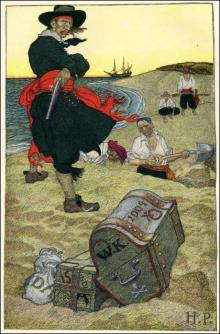 Howard Pyle's Book of Pirates
Howard Pyle's Book of Pirates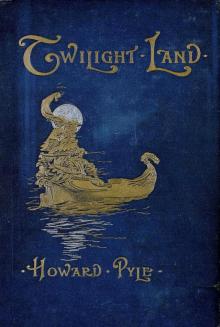 Twilight Land
Twilight Land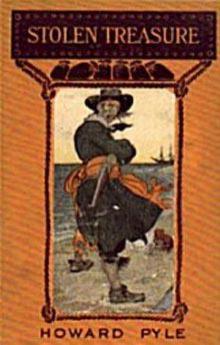 Stolen Treasure
Stolen Treasure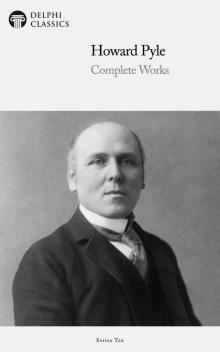 Complete Works of Howard Pyle
Complete Works of Howard Pyle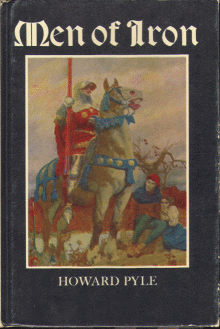 Men of Iron
Men of Iron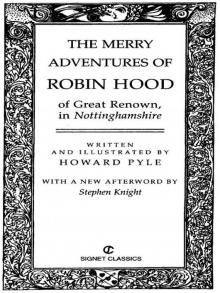 The Merry Adventures of Robin Hood
The Merry Adventures of Robin Hood The Wonder Clock
The Wonder Clock